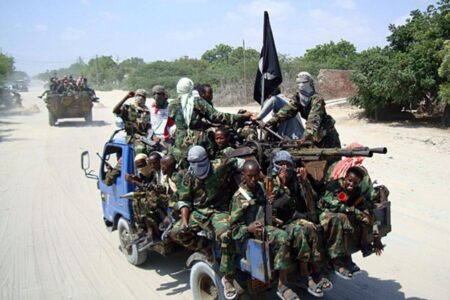
UN extends Somalia arms embargo amid government dissatisfaction
The United Nations Security Council has voted to maintain an arms embargo on Somalia over strong objections from its government, saying al-Shabab still seriously threatens peace and stability in the region and sanctions are needed to degrade its activities.
The resolution, which also expresses concern at the continued presence of affiliates of the ISIL (ISIS) group in the Horn of Africa nation, was on Thursday approved by a vote of 11-0, with Russia, China, Gabon and Ghana abstaining in support of the call by the Somali government, backed by the African Union, to lift the arms embargo.
The British-drafted resolution does modify the arms embargo to reflect the government’s progress in improving its management of weapons and ammunition. This includes allowing Somalia to import portable surface-to-air missiles, higher-calibre mortars, anti-tank guided weapons, some aircraft and vessels designed or modified for military use, and combat drones for use by its security forces and police – unless the UNSC committee monitoring sanctions objects within five working days of receiving notification from the government.
James Kariuki, the United Kingdom’s deputy UN ambassador, said the benchmarks identified following a recent technical assessment highlighting Somalia’s progress provide “a clear roadmap … that will help this council make further changes to weapons and ammunition measures in the future”.
“The steps made today will simplify processes for Somalia and its partners, and help speed up the journey,” he said.
The resolution keeps in place the codified arms embargo, a ban on the sale or transfer of key components of improvised explosive devices that al-Shabab has used, a ban on the import and export of Somali charcoal that was a key moneymaker, and travel bans and asset freezes on individuals threatening peace and associated with al-Shabab, including by financing or facilitating its activities.
The UNSC imposed the arms embargo on Somalia in 1992 to cut the flow of weapons to feuding clan-based strongmen who toppled leader Mohamed Siad Barre the previous year, plunging the country into civil war.
Somalia established a functioning transitional government in 2012 and has been working to rebuild stability in the face of armed attacks and one of the worst droughts the country has experienced that has brought thousands to the brink of famine.
Somalia’s government under recently elected President Hassan Sheikh Mohamud has been engaged in a new offensive against al-Shabab, including efforts to shut down its financial network.
US deputy ambassador Robert Wood expressed hope that the government will continue to make progress on the benchmarks, allowing for further easing of the arms embargo.
He said the sanctions regime adopted on Thursday is tailored to support and enable “robust action” by the government to combat al-Shabab, including by depriving the group of its financial resources. And he urged all countries to implement sanctions and deprive al-Shabab of the ability to access funds and weapons.
Source: Aljazeera





